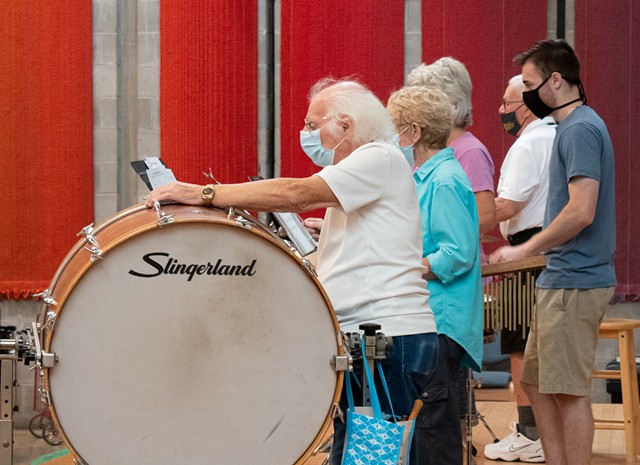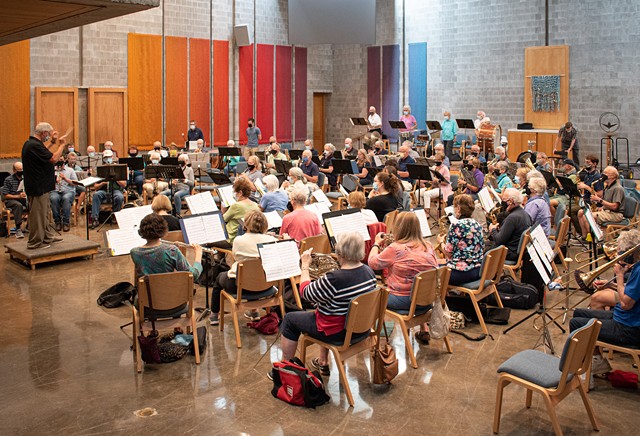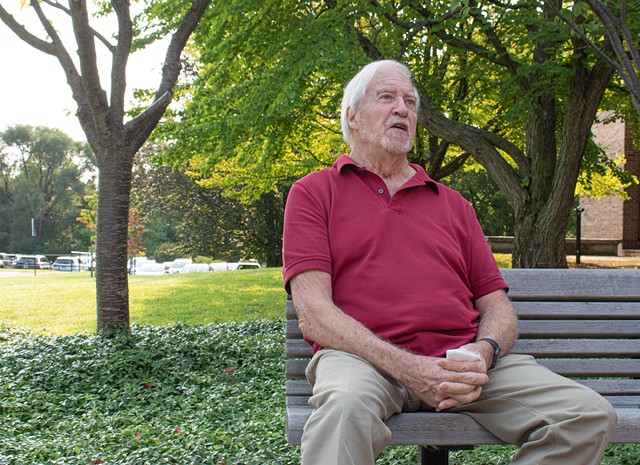
- PHOTO BY JACOB WALSH
- New Horizons began as a music ensemble for a handful of senior citizens. Thirty years later, it has 10,000 participants in 42 states and three countries.
He wanted to give people whom he saw as being stuck in the past, disconnected to their present and its future, a chance to improve their lives by making music. He called his ensemble New Horizons.
“I say often that music connects people to life,” says Ernst, who is now retired. “And probably most importantly, it connects you to other people.”
Thirty years later, the group he founded here has grown into the New Horizons International Music Association, a vast nonprofit network of 10,000 participants in more than 230 bands and orchestras operating in 42 states, five Canadian provinces, and in Australia.
In Rochester alone, New Horizons comprises three wind bands, three orchestras, two jazz bands, separate flute, clarinet and saxophone groups, and a chorus.
The organization plans to celebrate its 30th anniversary with a concert on Oct. 29 at 8 p.m. in Eastman Theatre’s Kodak Hall. The concert features the world premiere of “Ceremony and Celebration” by Larry Neeck, co-director of New Horizons’ Concert Band and Symphonic Band.
“It’s just meant to show the exuberance and joy of music,” Neeck says of the composition, “and then the joy that comes with being able to play in a band, and the shared joy in the music that all these people get.”
He calls New Horizons participants “fearless, brave people who have chosen to push themselves.”

- PHOTO BY JACOB WALSH
- Larry Neeck conducts the New Horizons Concert Band and Symphonic Band in a rehearsal for its 30th anniversary concert on Oct. 29, 2021.
Many who join a New Horizons ensemble abandoned an instrument they played in their youth and are yearning to return to it. They view their participation as not only a chance to become reacquainted with their younger selves, but to expand their social circles into a community creating art.
Clarinetist Sue Ames had not picked up an instrument since high school before she started playing with New Horizons in 2005 upon retiring. She says the social aspect of the group is essential for her.
“There is something really special about playing music together,” she says.
Trumpeter Michael Doolin had a similar return to music. He says he hadn’t played in 60 years, since he was a student at The Aquinas Institute of Rochester.
“That’s really the whole point of New Horizons,” Doolin says. “It’s not too late.”
Ernst says New Horizons was meant to be an example for those who wanted to start bands in their communities and to debunk the narrative that one could be too old to start making music.
“Before New Horizons started, the general feeling was that there was a window of opportunity in elementary school when you could start on an instrument,” he says.
Many New Horizons musicians are retired from medical, legal, engineering, and education fields and wanted to do something different. Some had no prior musical experience.
“People with no musical background at all can get started, they can learn to read music, and they can learn to play an instrument,” Ernst says. He’s also fond of telling musicians, “In New Horizons, your best is good enough.”

- PHOTO BY JACOB WALSH
- "In New Horizons, your best is good enough," says its founder Roy Ernst.
“A person who starts on an instrument taking private lessons, they tend to lose interest if they're not part of a group,” he says.
The pandemic caused major complications, making in-person rehearsals and group lessons all but impossible. The band had to rehearse over Zoom with the help of a program called SmartMusic, which allows the musicians to play along to a professional recording. They couldn’t hear one another, but familiarizing themselves with the music was preferable to no rehearsal at all.
“The big part of it is camaraderie — being around other people,” says Petar Kodzas, dean of Eastman Community Music School. “So, I think that was the part that was seriously challenged.”
The New Horizons anniversary concert will be the ensemble’s first since the pandemic began.
There is an excited but focused energy among the musicians. Performing live is a big part of it, but so is the opportunity to socialize and interact face-to-face.
“That’s the beauty of the whole thing: It’s not just about music,” Neeck says. “It’s about companionship, it’s about pushing yourself, doing something new, staying vital, staying alive.”
WXXI-TV re-airs its documentary "Music for Life: The Story of New Horizons on Oct. 29 at 10 p.m.
This story includes reporting by April Franklin.
Daniel J. Kushner is CITY’s arts editor. He can be reached at [email protected].
